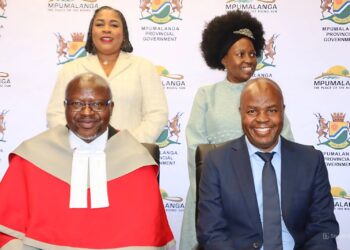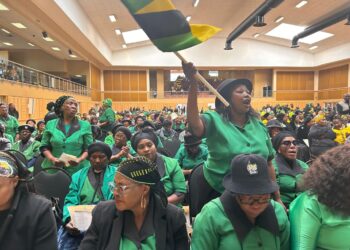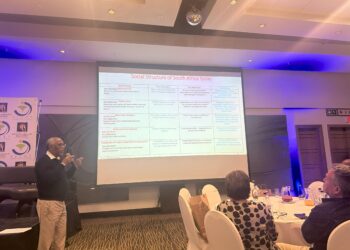With Joseph “The Great” Ntimba hosting Hadebe Hadebe
Many commentators maintain that the coronavirus-powered crisis is a great catalyser for change and that weaker systems of governance will be severely exposed.
This observation is indeed true in SA and makes people to ask about their public representatives, “What have they been busy doing all along?” Responses to the urgent needs of citizens have been marred with inefficiency, corruption and outright confusion.
To this point questions about food and its availability remain unanswered as parcels are found in cars of politically-inclined individuals and gangs. And frustration grows as a result. What is happening and who creates the problems? Poor knowledge systems and meaningless data.
The situation makes one to believe that the people in certain positions, especially closer to the masses, have also been invited from some country overseas to come and assist. A recently arrived Cuban doctor can be forgiven when he fumbles. But the gaffes of local councillors and others are simply mind-boggling.
The procurement and distribution of food parcels to the ‘needy’ have exposed what we always avoid to discuss: cluelessness, lethargy, corruption, nepotism, politicking, stupidity, etc. Unfortunately, nobody has cared to admit that many communities are subjected to this on a daily basis. We have also continued to vote back people who have no idea about public administration. Their concerns are other things but delivering much needed services and goods to citizens.
Hiding behind the fact that COVID -19 took everyone by surprise and that the problems it creates is unprecedented, that is seriously a non-starter. Public service administration under people who understand what they are doing wouldn’t be as shell-shocked as we witness in each of the lockdown days. Absolute confusion and cluelessness.
Why is procuring and delivering of food parcels such a huge disappointment?
First and foremost, the SA constitution and other pieces of the law geographically divide the country to national, provinces, district municipalities/ metropolitan areas, local municipalities and wards. This arrangement also allocates functions and powers according to each level as well as assigns specific responsibilities.
The reason so many people occupy positions of premiers, mayors, councillors and administrators is that they have to a legal to serve in those capacities in order to assist in the running of the state. They are therefore legally mandated to carry out specific duties that must ensure that citizens derive the maximum benefit from what they are supposed to do.
The distribution of food parcels exposes weaknesses in how information and data are generated, organised, accessed and utilized. Let us take the example of statistics (data) as an example, the former statistician-general Pali Lehohla should be relevant in this discussion for his knowledge and lengthy experience in generating figures to support evidence-based decisions in public administration.
In any way, the national level and provinces tend to deal with larger sets of data that is broadly aggregated to assist decision-makers to develop requisite interventions and programmes be it for employment, health, security and social interventions. A person at national level deals with percentages and non-specific information: 29.1% unemployment, 40% of the population lives on less than R10/ day, etc. This information does not tell you details like Mandla Tau of 288 Bakwena Street Zone 1 Meadowlands in Soweto is unemployed, hungry or ill. Nonetheless, the data is important for informed decision-making.
Now turn the attention to the municipalities (metros, district and local). Many political analysts characterize this level of government as the heartbeat of government because this is where contact with individuals and communities occurs. This therefore means that representatives and officials at this level of the state should be the most important and skilful in the entire public administration. They are supposed to have ‘first-hand information and experience’ about everything that is happening in their jurisdictions.
Alas! The representatives and officials appear to have no idea about what is going on where they live. Again taking the example of Mandla Tau above. A municipal office should have disaggregated data that should take you to within less than one meter from Tau’s house. That is better than Google maps. Therefore, councillors shouldn’t be working with averages and percentages in broader sense, but they should be having real data.
What this essentially means is that information in Tshwane metro’s seven regions and individual wards within each of these regions should not be exactly identical. For example, Mamelodi is in the same region 6 together upmarket Pretoria East. But the township isn’t the same in Mandela, Mamelodi West and Stoffelpark. So, data in the possession of councillors should be able to direct exactly where indigent families and individuals – even without them having to come forward.
Councillors should also know pertinent information about individual households. House headed, number of people, income, school going children, adults, etc. All this assist to know who can get free electricity, who is hungry, who isn’t working and so forth. But the truth is, this is not happening. Families in townships have extended houses to hire rooms out to people, usually migrant workers and illegal foreigners.
This places a strain on public infrastructure including water, electricity, refuse removal, sewerage, clinics, policing and schools. The illegal connections to water and power as well as erection of illegal structures in Mamelodi’s Mahube created tensions between people that needed the mayor, premier and security personnel to intervene. The problem did not begin in day one and exploded at night, but it developed over time.
Where were councillors in the area?
This question is applicable to food parcels as well. If COGTA or SALGA were to go around the country to ask individual councillors how many people and individuals in their respective wards desperately need food and other basic suppliers, it is unlikely they will be able to respond. Also, does it make sense to give families same quantities of food irrespective the number of people in a house? How often is this information updated and made available for plans and programmes?
What is sad is that even documents such as Integrated Development Planning (IDP) are not accurate and are usually based on ‘politics’ and subjective information. The video showing a truck delivering food parcels to a private home of a politician somewhere in Mpumalanga symptomizes how local government is generally run. It is for the reason local politicians seem to have more money than everyone else. Food parcels presented yet another chance for them to do what they know best, stealing or misappropriation of what is not meant for them.
The long queues in Olivenboschhout outside Centurion confirms that nobody knows what is happening in wards. And when corruption and service delivery failures occur, we all act surprised. It is a pity that even migration and security structures are equally in the dark. The crisis for food is exacerbated by the unknown number of illegal migrants roaming SA streets.
At the end of the day, this problem does not only impact menial tasks as delivery of food. It affects other levels of policy making: public health, security and fiscal. Outsourcing of state services to NGOs instead of the people who have a constitutional mandate to do the job is a bigger problem. One of the reasons why public finances are under pressure is that the state pays twice for a single job: it pays the NGO and the salary of the official hired to do the job.
It is no coincidence that this gets passed to citizens who have to pay twice for all services. In SA, one needs a private medical aid while there are hospitals. Kids go to expensive private schools when there are cheaper public schools.
It all goes down to data and information and also those who are supposed to develop and use it.
Even now, do we know who must get food, and why?























